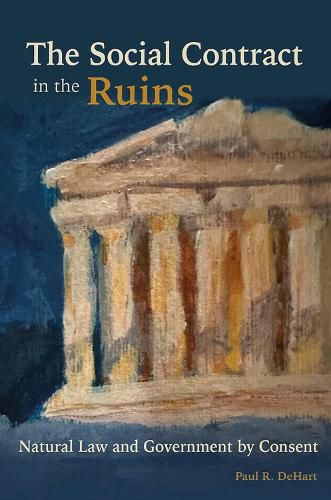Readings Newsletter
Become a Readings Member to make your shopping experience even easier.
Sign in or sign up for free!
You’re not far away from qualifying for FREE standard shipping within Australia
You’ve qualified for FREE standard shipping within Australia
The cart is loading…






Scholars who write on the relationship of natural moral law to social contract theory view the principles of these theories as in conflict and unreconcilable. For example, if natural law creates the foundation for political governance, then the consent of the governed is not a necessary element. In contrast, social contract theory requires the implicit consent of the governed to establish and justify a government's legitimacy. In his latest work, Paul DeHart argues that natural moral law and social contract theory are logically and metaphysically compatible and that the principle of consent embodied in the social contract depends upon classical natural law for its very intelligibility.
According to the Declaration of Independence, governments derive "their just powers from the consent of the governed." This statement embodies the theoretical commitment of Revolutionary Era Americans to government based on a social contract. They rejected traditional metaphysical and philosophical grounds of political authority founded in natural law, such as divine right, natural subordination, and the right of the wise and good to exercise political rule over a benighted citizenry. Instead, they inferred the necessity of consent from the fundamental equality of individuals and maintained that the relationship of government to the governed is not given by nature but is a rational enterprise constructed by individuals.
In short, the relation of classical philosophy-its account of fundamental reality, ethics, and its view of humans-to the social contract theory of the early moderns has been viewed as one of essential conflict rather than one of compatibility or essential connection.
In The Social Contract in the Ruins DeHart asserts that any intelligible account of the claim that consent forms a necessary condition for political authority and obligation depends necessarily on the sort of morally and metaphysically realist account of natural law that one finds in, say, St. Thomas Aquinas. Thus the real conflict and, indeed, contradiction, lies between any intelligible social contract theory and modernist metaphysics and ethics.
$9.00 standard shipping within Australia
FREE standard shipping within Australia for orders over $100.00
Express & International shipping calculated at checkout
Scholars who write on the relationship of natural moral law to social contract theory view the principles of these theories as in conflict and unreconcilable. For example, if natural law creates the foundation for political governance, then the consent of the governed is not a necessary element. In contrast, social contract theory requires the implicit consent of the governed to establish and justify a government's legitimacy. In his latest work, Paul DeHart argues that natural moral law and social contract theory are logically and metaphysically compatible and that the principle of consent embodied in the social contract depends upon classical natural law for its very intelligibility.
According to the Declaration of Independence, governments derive "their just powers from the consent of the governed." This statement embodies the theoretical commitment of Revolutionary Era Americans to government based on a social contract. They rejected traditional metaphysical and philosophical grounds of political authority founded in natural law, such as divine right, natural subordination, and the right of the wise and good to exercise political rule over a benighted citizenry. Instead, they inferred the necessity of consent from the fundamental equality of individuals and maintained that the relationship of government to the governed is not given by nature but is a rational enterprise constructed by individuals.
In short, the relation of classical philosophy-its account of fundamental reality, ethics, and its view of humans-to the social contract theory of the early moderns has been viewed as one of essential conflict rather than one of compatibility or essential connection.
In The Social Contract in the Ruins DeHart asserts that any intelligible account of the claim that consent forms a necessary condition for political authority and obligation depends necessarily on the sort of morally and metaphysically realist account of natural law that one finds in, say, St. Thomas Aquinas. Thus the real conflict and, indeed, contradiction, lies between any intelligible social contract theory and modernist metaphysics and ethics.